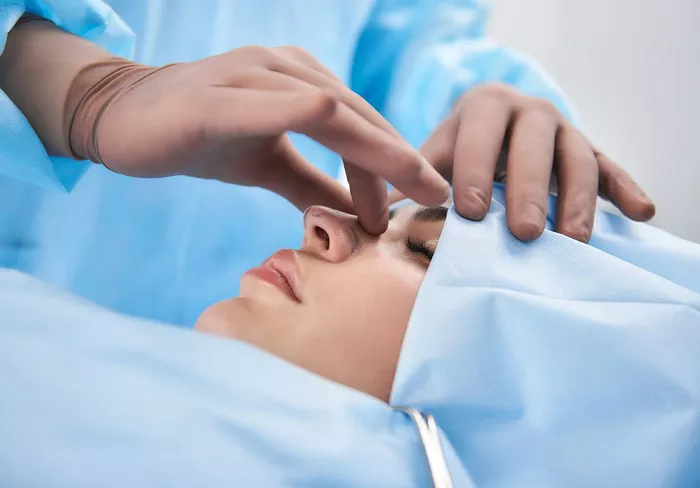Rhinoplasty, commonly referred to as a nose job, is a cosmetic surgical procedure that aims to reshape the nose. It’s a popular surgery that can improve the appearance of the nose and enhance facial harmony. However, like any surgical procedure, rhinoplasty has some risks and side effects, including bruising and swelling. One of the most common questions patients ask after rhinoplasty is how long do black eyes last after rhinoplasty? In this article, we will discuss the factors that can affect the duration of black eyes after rhinoplasty and provide tips on how to minimize bruising and swelling during the recovery period.
Understanding Black Eyes After Rhinoplasty
Black eyes, also known as periorbital ecchymosis, are a common side effect of rhinoplasty. They occur when blood vessels in the area around the eyes are damaged during the surgery, leading to bleeding and bruising. The severity of black eyes can vary depending on the extent of the surgery, the patient’s skin type, and their overall health.
The extent of Surgery Affects How Long Black Eyes Last After Rhinoplasty
The extent of the surgery can affect the severity of black eyes after rhinoplasty. More extensive surgeries that involve significant changes to the nasal structure may result in more bruising and swelling around the eyes. Patients who undergo open rhinoplasty, where the surgeon makes an incision in the columella, which is the tissue between the nostrils, are more likely to experience black eyes than those who undergo closed rhinoplasty, where the incisions are made inside the nose. In general, the more extensive the surgery, the longer the black eyes last after rhinoplasty.
Skin Type Affects How Long Black Eyes Last After Rhinoplasty
Patients with fair skin may be more prone to bruising and swelling after rhinoplasty. This is because fair skin is more transparent, making bruises and discoloration more visible. Patients with darker skin may not experience as much bruising or swelling, but the discoloration may still be present. The skin type can affect how long black eyes last after rhinoplasty, with fair-skinned patients experiencing black eyes for a longer duration.
Age Affects How Long Black Eyes Last After Rhinoplasty
Older patients may experience more bruising and swelling after rhinoplasty. This is because the skin becomes thinner and less elastic with age, making it more prone to bruising and swelling. Older patients may also have weaker blood vessels, which can increase the risk of bleeding and bruising. As a result, black eyes may last longer in older patients than in younger patients.
Medications Affect How Long Black Eyes Last After Rhinoplasty
Certain medications, such as blood thinners and aspirin, can increase the risk of bleeding and bruising after rhinoplasty. Patients should inform their surgeon of any medications they are taking before the surgery. The surgeon may advise the patient to stop taking certain medications before the surgery to minimize the risk of bleeding and bruising. If the patient is taking blood thinners or other medications that increase the risk of bleeding, black eyes may last longer after rhinoplasty.
Tips to Minimize Black Eyes After Rhinoplasty
While it is impossible to completely prevent black eyes after rhinoplasty, there are several steps that patients can take to minimize bruising and swelling during the recovery period.
Apply Cold Compresses
Applying cold compresses to the area around the eyes can help to reduce swelling and minimize bruising. Patients can use a cold gel pack or a bag of frozen peas wrapped in a towel to apply cold compresses to the area. Patients should apply the compresses for 10-15 minutes at a time, several times a day. Cold compresses can help to constrict blood vessels, reducing swelling and minimizing the duration of black eyes after rhinoplasty.
Elevate the Head
Keeping the head elevated can help to reduce swelling and minimize bruising after rhinoplasty. Patients should sleep with their head elevated on several pillows for the first few days after the surgery. Elevating the head can help to improve blood flow to the area, reducing swelling and minimizing the duration of black eyes after rhinoplasty.
Avoid Strenuous Activity
Strenuous activity can increase blood flow to the area around the nose, leading to more swelling and bruising. Patients should avoid strenuous activity, such as exercise or heavy lifting, for at least two weeks after the surgery. Avoiding strenuous activity can help to reduce the risk of bleeding and bruising, minimizing the duration of black eyes after rhinoplasty.
Take Arnica
Arnica is a natural remedy that can help to reduce swelling and bruising after surgery. Patients can take arnica supplements or use arnica cream or gel to help minimize black eyes after rhinoplasty. Arnica can help to improve blood flow to the area, reducing swelling and minimizing the duration of black eyes after rhinoplasty.
Follow Post-Operative Instructions
Following post-operative instructions is essential for minimizing black eyes after rhinoplasty. Patients should avoid smoking and drinking alcohol for at least two weeks after the surgery. Smoking and drinking alcohol can increase the risk of bleeding and bruising, prolonging the duration of black eyes after rhinoplasty. Patients should also avoid blowing their nose or wearing glasses for the first few weeks after the surgery. Blowing the nose or wearing glasses can increase the risk of bleeding and bruising, prolonging the duration of black eyes after rhinoplasty.
Conclusion
Black eyes are a common side effect of rhinoplasty, but they are temporary and will resolve on their own. The duration of black eyes after rhinoplasty can vary depending on several factors, including the extent of the surgery, skin type, age, and medications. Patients can take steps to minimize bruising and swelling during the recovery period, including applying cold compresses, elevating the head, avoiding strenuous activity, taking arnica, and following post-operative instructions. By following these tips, patients can minimize black eyes after rhinoplasty and enjoy a smoother, more comfortable recovery period.

